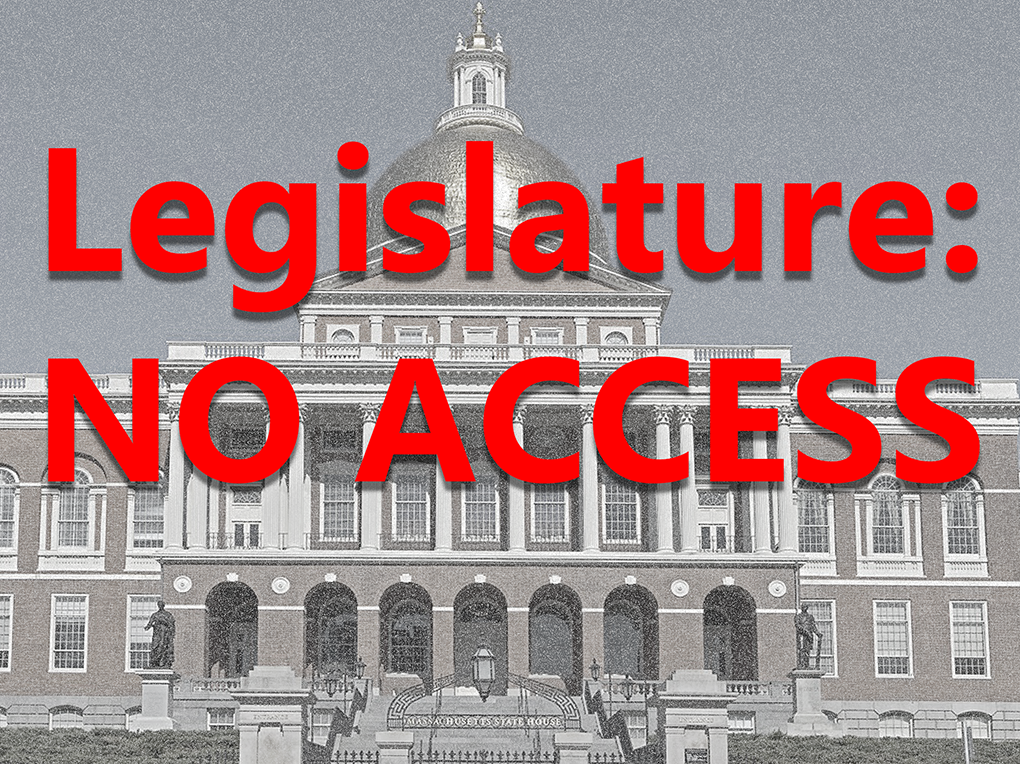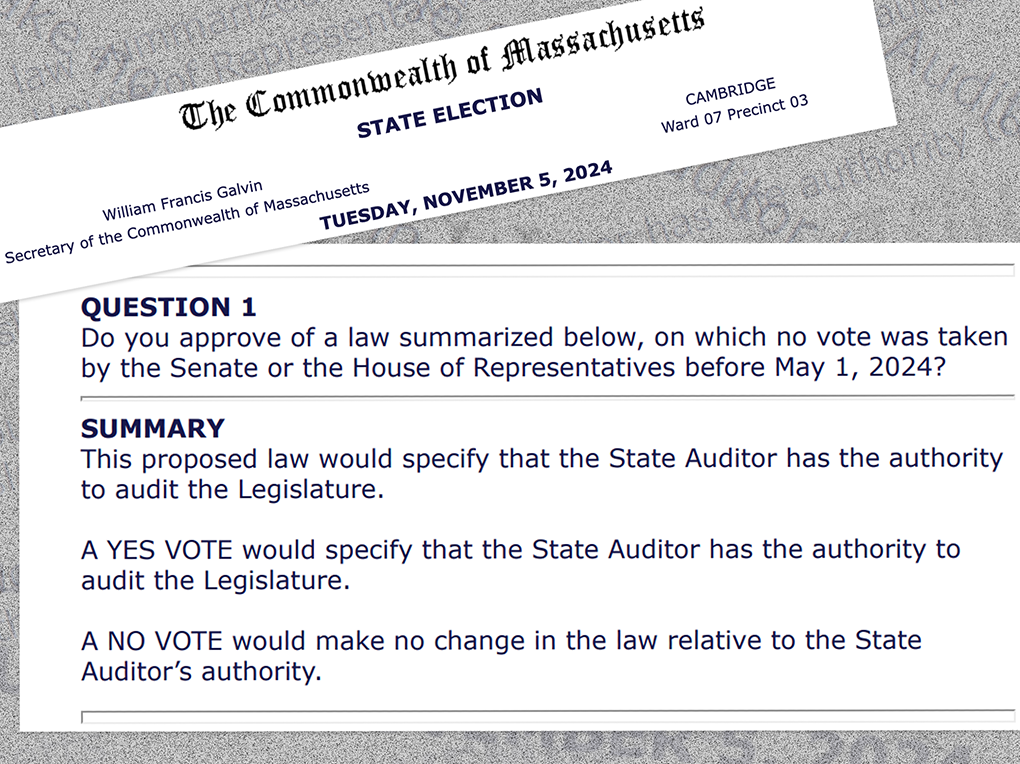Ballot Question 1: MassLandlords Recommends Vote “Yes” to Hold the Legislature Accountable via Audit
. Posted in News - 0 Comments
By Kimberly Rau, MassLandlords, Inc.
There are four statewide ballot initiatives on the November 2024 ballot. MassLandlords strongly supports a “yes” vote on Question 1: Should the auditor oversee the Legislature? Voting yes would require the Massachusetts legislature to give the state auditor access to its inner workings, thereby correcting one of the many ways the legislature holds itself above the law and accountability.

The state legislature is not subject to the open meetings law, the open records law and has been able to deny the state auditor access to its inner workings. It’s time for that to change. (Image: Derivative Mass Statehouse eb1 cc-sa Fcb981)
Every four years, voters in Massachusetts elect a state auditor. This is a constitutionally created position. It is intended to ensure that state agencies follow the laws and regulations that govern them by evaluating their documents and records.
But there’s one government body the auditor hasn’t been able to investigate, and that’s the state legislature.
MGL Chapter 11, Section 12, states that the state auditor has the authority to audit “all departments, offices, commissions, institutions and activities of the commonwealth.” Question 1 would specifically add the legislature to this verbiage in order to ensure the auditor can access it for review.
The ballot initiative was introduced by current state auditor Diana DiZoglio. Legislators are largely not in support of Question 1.
If Question 1 Passes, What Happens?
Question 1 does not give the state auditor the ability to view everything the legislature does. Some activities, including votes, debates, committee assignments and policy priorities, are considered off-limits from executive interference, which would include the state auditor. Even if Question 1 passes, these actions will not be available for audit.
Tufts' Center for State Policy Analysis has a very detailed document that goes into the intricacies of Question 1. It suggests that even if the ballot initiative succeeds, the legislature holds a lot of power to delay or otherwise obstruct an audit. Theoretically, the legislature could go so far as to defund the auditor’s office, which would likely result in the matter going before the courts.
“Absent legislative consent, the auditor will struggle to pursue any investigations of the legislature,” the document states in its “Reasons for a No Vote” section. But the “Reasons for a Yes Vote” section is far more compelling to us.
“[A] fight between the auditor and the legislature could end in a stalemate, but it could also trigger a court ruling that empowers the auditor to investigate non-core legislative functions, potentially keeping the public more informed about the behavior of our state lawmakers,” the document states.

Question 1 in the November 2024 election asks voters to decide if the state auditor should be allowed to audit the Massachusetts legislature. We fully support this. (Lic: CC by SA 4.0 MassLandlords Inc.)
The Argument for Question 1
The state allows for two 150-word arguments for and against each ballot question, though it is clear that it does not endorse either opinion.
The argument in favor of Question 1 was written by Neil Morrison for the Committee for Transparent Democracy. Morrison argues that the state auditor is elected by the people to audit state entities to ensure their government is working for them.
“The State Legislature is the only state entity refusing to be audited by the State Auditor’s office,” Morrison writes. He goes on to state that while the legislature says the audits it conducts on itself through a private vendor are sufficient, Massachusetts has one of the least transparent legislatures in the country.
“Support for this initiative will help the State Auditor’s office shine a bright light on how taxpayer dollars are spent to help increase transparency, accountability and accessibility for the people of Massachusetts,” Morrison concludes.
The Argument Against Question 1
Jerold Duquette, of MassPoliticsProfs.org, wrote the argument against Question 1. He argues that a legislative audit conducted by the state auditor would violate the separation of powers guaranteed in the state constitution, because the state auditor is a member of the executive branch of government.
Duquette argues the auditor’s job is to measure government officials’ performance in carrying out public policy goals, which are determined by the legislature.
“The State Auditor cannot substitute her interpretation of those goals for the Legislature’s without compromising the constitutional independence and preeminence of the Legislature,” Duquette states.
In other words, he argues, auditing the legislature could turn the state auditor into a political actor and compromise their objectivity.
Checks and Balances are Lacking in the Legislature
Those who oppose Question 1 state that allowing the auditor access to the legislature would violate the separation of powers that govern the state and take power away from the voters. A majority report was written by the Special Joint Committee on Initiative Positions to try this argument.
“In a representative democracy, power rests with the constituents who elect their Representatives and Senators and hold them accountable,” reads the majority report for Question 1.
“Rather than achieve its stated goals, the proposed Initiative Petition would limit the power of the voters who elect Members of the Legislature by expanding the powers of the Executive Branch; essentially, the Auditor would supplant the people for herself in holding the Legislature accountable,” it continues.
We couldn’t disagree more. Massachusetts constituents can’t easily perform their own audit on the legislature, because the legislature does not have to follow the open meeting or public records laws. How, exactly, is anyone supposed to get information from a government body that gets some of the lowest marks for transparency in the country? Separation of powers is important, but so are checks and balances, and there aren’t as many avenues for that as there should be with our legislature.
Millions of Dollars in Secret Perks for Reps and Senators
Take, for instance, the long-recognized perk of senators and representatives “earmarking” funds for special projects in their districts when setting the annual statewide budget. The Senate’s 2024 $58 billion budget proposal had more than $4 million in such earmarks before most of the Senate even saw the budget. They included $1.5 million for a conference center/wedding venue in Senate President Karen Spika’s district, and $250,000 for naval vessel care at Battleship Cove, which is in Senate budget chief Michael Rodrigues’ district.
These perks, along with many others, were written in before the Senate had a chance to read or vote on the budget, and that doesn’t include the earmarks from other senators for their districts.
Meanwhile, in the House, representatives were adding around $5 million of their own earmarks into their budget. They were written into other budget amendments, and presented as part of a document with more than 12,000 words, which lawmakers had approximately a half hour to read before voting.
“There’s no opportunity for anybody in the public to see what’s being done — until it’s too late,” former representative Jonathan Hecht told the Boston Globe.
What’s more, there’s a reported longstanding practice of not filing legislation or amendments to bills to secure funding for these pet projects. Not only is this practice not illegal, it’s apparently encouraged.
“When you’re on the committee [with Michlewitz] and you’re three doors down . . . we talk,” Rep. Patricia Haddad told the Boston Globe. “For me to file an amendment would be kind of dumb.”
The State Auditor is a Constitutional Office
Then there’s the matter of the auditor position itself. The state auditor is a constitutional office. This means that the separation of powers also guaranteed in the constitution has allowed for a directly elected officer (the auditor) who is accountable to the people. Arguably, this is not really an executive position at all, but instead an office of independent oversight. Why the legislature feels the need to find their own independent auditor outside of the one elected by the people is a question beyond the scope of this article.
The state auditor is performing their duty to the residents of Massachusetts when they perform an audit; the legislature is denying citizens this right by keeping the auditor out of their books.
In other words, the people have a right to know what the legislature is up to, and the state constitution gives them a way to do this, through the state auditor.
Conclusion
If Question 1 passes, that doesn’t mean the auditor will get to look at everything the legislature does. Some activities will still be protected and remain private, no matter what the public thinks about that.
It also doesn’t mean the auditor will be able to immediately perform an audit. If Question 1 passes, there’s a good chance the outcome will be challenged in court. Plus, in order for any ballot measure to take effect, the legislature must enact it. Expect delays.
However, this is a rare chance for the public to get a sliver of transparency from their elected officials. This is something they should be offering up on their own, but since they aren’t, a democratically enacted ballot question is the next best thing. Democracy works. Let’s make it work better.
We support transparency and accountability across all levels of government, and urge you to join us in voting “yes” on Question 1 this November.




